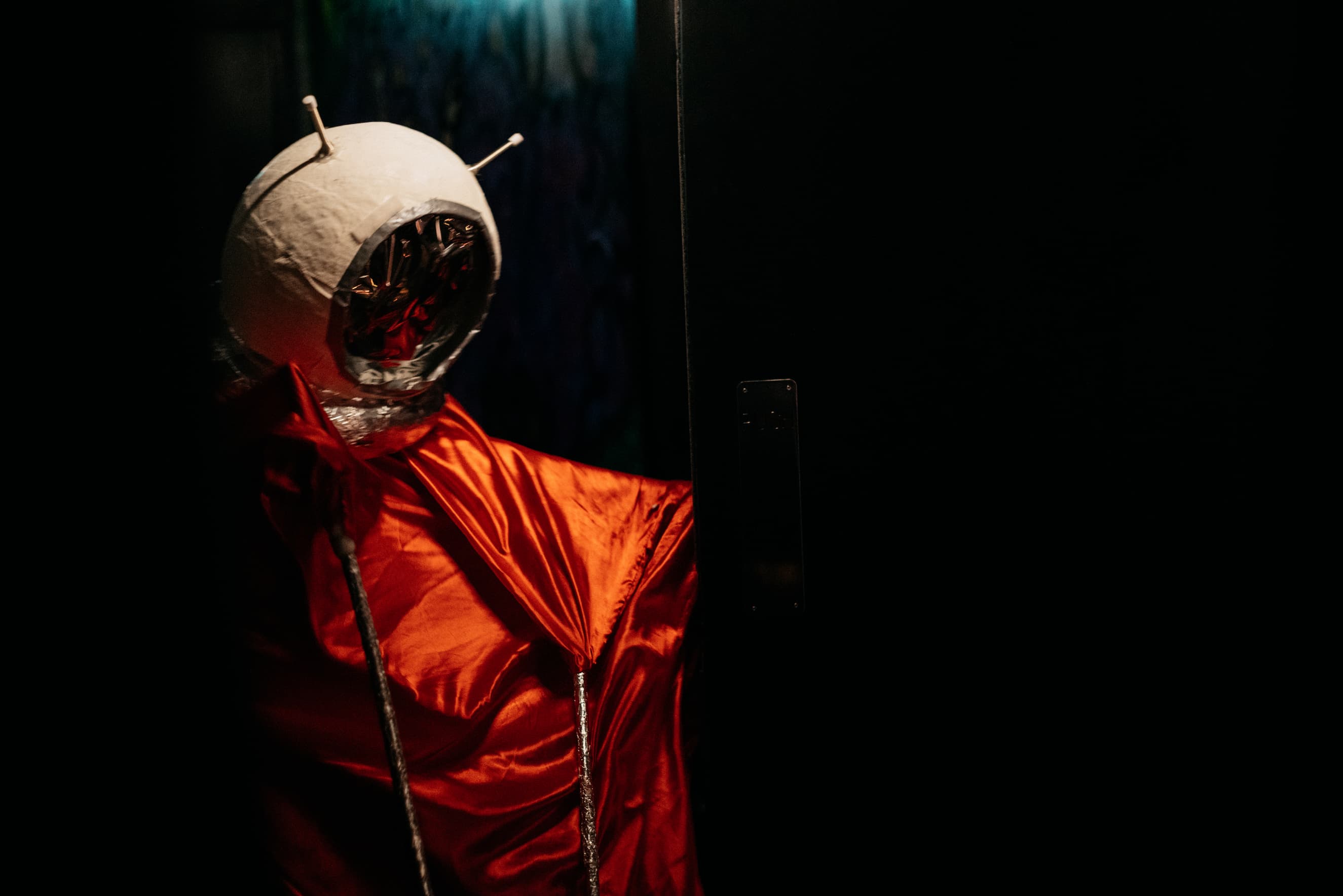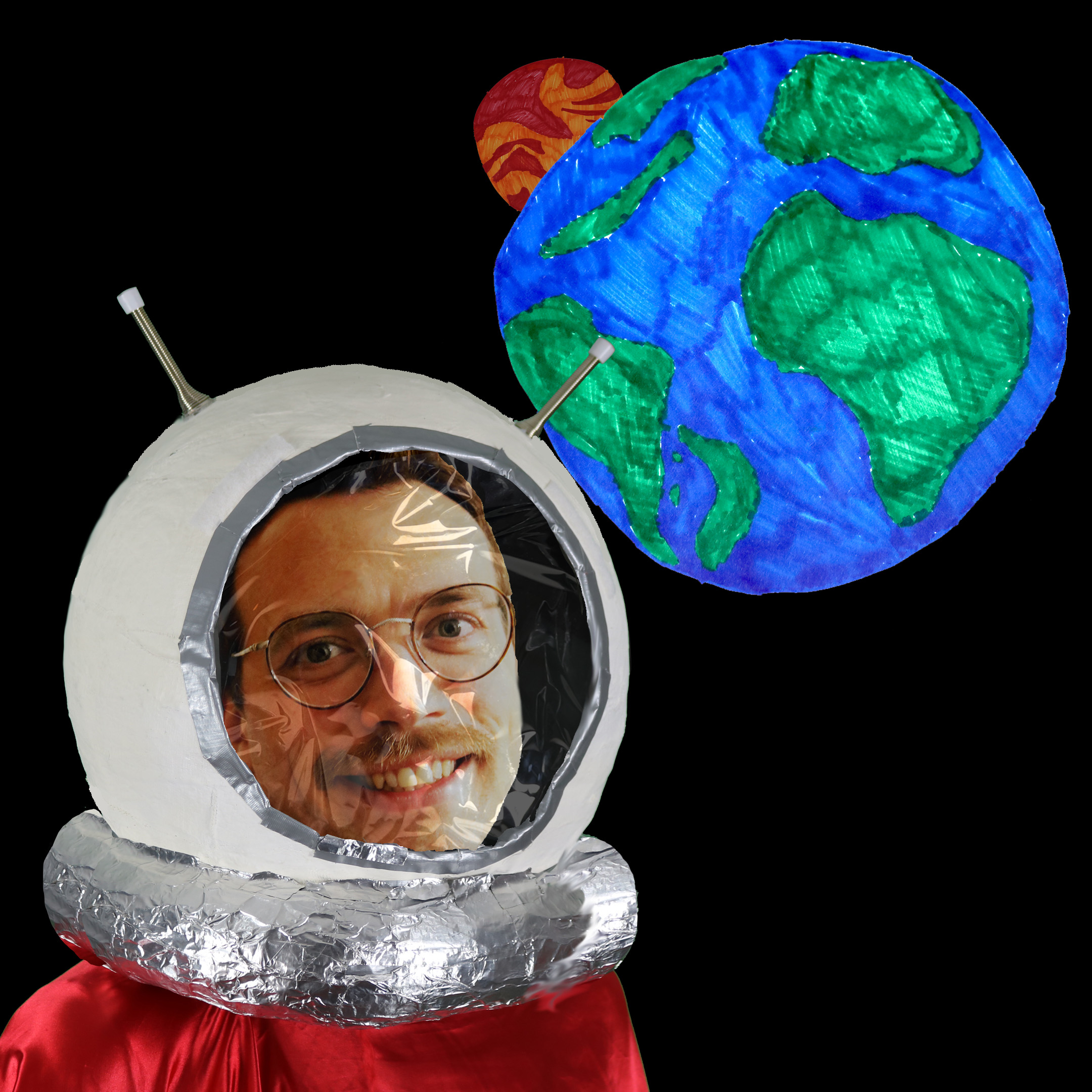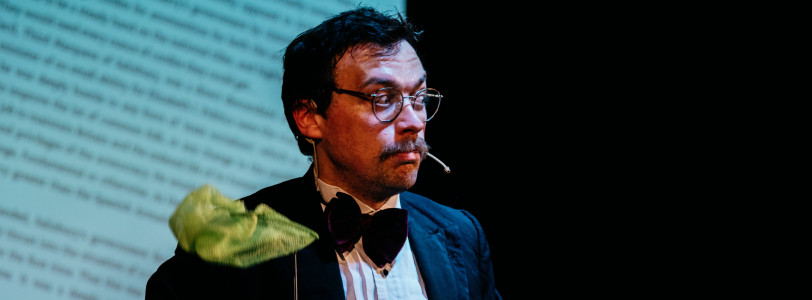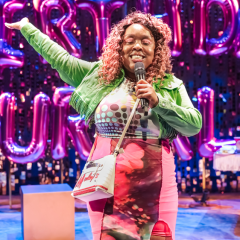Could you first introduce yourself to the reader?
Hello! I am a musical comedian and show maker/performer/ifIwashonesttheatremakerbutthatfeelslikequiteamanteltowear-er from Manchester.
What does your job involve? Give us the typical outline of a day.
As a comedian that does music, my job involves having an idea, writing material, and maybe turning written material into a song or trying to figure out how to do it on a loop pedal. When I do my shows it’s that but also figuring out how to make dumb props, videos and audio using the sort of things you can get from a party supply shop. Then I test it out in front of an audience, and if they like it I keep it, if not it’s gone! Get out! Leave! Or more often, I’ll re-jig, re-write and make it even more stupid and then it might get told repeatedly.
Especially for making long form shows, I read a lot about random topics that I really over-focus on and try to figure out why I am so drawn to them.
Less often I will write material for other shows to include, such as radio sketches, or more recently I try to write things to pitch to production companies.
I also run an organisation with co-producer Daniel Nicholas called Cultural Comedy Tours, where we invite comedians (and ourselves) to deliver funny tours based on and around museums, art galleries, and heritage sites.
That’s the fun bit.
But a lot of my time in a day is spent sending emails for work at gigs and festivals, arranging meetings to potentially get work or funding for developing a show that could lead to work, or to ask people if I can get details to ask other people to arrange a meeting that might lead to work or funding.
After doing a gig or some work, I also spend a lot more time than should be necessary for the human mind to do by failing to properly write invoices, sending them, and then re-writing them as I missed something on them.. I think my record so far is 4 times for a single invoice.
What’s great about your job?
For the most part I get to decide what I do creatively, and the brilliant thing about stand up comedy and self-produced work is that you don’t have to wait for anyone to get going with making it and you can arrange your own ways to perform it. And what you share is something you really care about and you hope resonates with an audience in some way. Whether anyone shows up is a bit that I won’t focus on in the great bits of the job.
I don’t think there’s anything quite like the feeling of performing comedy live, I’ve acted and been in bands, but the immediacy and gratification of delivering something you thought of and wrote to an audience that then laughs at it has to be closest thing to doing an actual magic trick there is, unless you’re a wizard or summat, in which case actual magic is probably the closest thing.
It’s also great with my feet in the museum, theatre and comedy worlds to get to meet such a wide range of different people. In my latest podcast I get to speak to people from universities, museums, comedy, professional gambling and more who share their knowledge and interests with me, and that’s something I feel very privileged to get to do.
What are the bits you don’t like or find challenging?
Having recently become more aware of the neurodivergences I have, it’s brought a lot of social and network-y aspects of the work that I struggle with into focus. There’s a lot of expected behaviour that I previously didn’t have the capacity to be able to do or realise, and I think that’s been challenging in a way I didn’t appreciate previously.
You’ve also got to be your own boss, and that’s very exciting, but I’m also a bad boss and an even worse employee, and so there can often be quite a lot of friction at our AGMs.
As will be no surprise it’s also a financially inconsistent career to have and establish, and you can often feel like you’re on a treadmill chasing something but you’re not quite sure what that is.
Also it’s annoying when I do something that I think is very funny only to find out with an audience it’s not. How rude, world!
What are the highlights of your career to date?
My show that I developed through lockdown currently going on tour to venues and audiences that have asked to watch it feels like a real career highlight, but maybe I should say some accolades or awards?
Being part of the BBC New Comedy Awards in 2017 was a huge thing for me, as that was the first year I’d really decided to be fully a ‘musical’ comedian (just holding my guitar and using it throughout the set rather than in bits of it), but whilst awards and competitions and all that are nice, it brings with it comparing yourself to others on a particular night, in a particular set of circumstances and with a goal of advancing or winning at a relationship with an audience, which can make it less fun for me.
How would you describe your show?
Edy Hurst’s Comedy Version of Jeff Wayne’s Musical Version of H.G. Wells’ Literary Version (Via Orson Welles’ Radio Version and Steven Spielberg’s Film Version) of the War of the Worlds is a big dumb lo-fi comedy show that finally puts to rest 125 years of remakes, reboots and rip offs of the classic science fiction novel, the War of the Worlds.
I’ll be honest, if you read the title and weren’t on board at that point, I’m not sure how anything else I say can help describe the show.
Did Covid-19 change the way you create work? Do you approach shows with a different mentality now?
Yes! I think it had to, right? Even if after that you just thought ‘I’ll do more of the same again please.’
This show was in development pre-lockdown, and over the course of being stuck in the house I used it as a way to really dig into research surrounding The War of the Worlds and its many many adaptations. For something with such a big legacy this was a great way to go through and write songs and edit the show, being able to share the process through a podcast too.
I think the big change was that without a ‘circuit’ to be performing to, I got to stop and think about what I want to do, focussing on specific shows with a single (loose) concept, and also having the space and time to make a lot of lofi but technically demanding things that I think had I regularly been going out to Fringe venues in basements and broom cupboards across the UK I may not have challenged myself to.
I’m not an observational performer or writer in the way that a traditional stand up would be considered, instead I seem to use something quite niche as a metaphor to feed my experiences through. This might all change again, but for the time being that’s where I’m at.
A huge thing in lockdown was becoming aware of my ADHD. Previously I had always thought that if I didn’t have to worry about day job things and income and leaving the house, I could really focus and create exactly what I want and feel very fulfilled. But once I was actually in that situation it was a big discovery to find out ‘ah, no, it's me isn’t it?’
Of course there was also the societal anxiety of a pandemic too that might have been playing on my mind, but I’ve got to save something to process in a few years.
What was your career path into this job? Have you also worked outside the arts?
I always liked performing and showing off. When I was younger I went to a stage school thing at the weekends, and then was in lots of school plays before being part of National Youth Theatre GB (although not being cast in any productions to be fair).
I studied Fine Art at university and that was largely performance focussed, because I love making my life as artificially difficult as possible. Whilst at university in Leeds I started stand-up comedy following some very bad first experiences at gong shows a few years before and have been gradually working along since then.
I have worked in all sorts of jobs from theme parks, school playground attendee, studio supervisor, finance assistant, marketing assistant and most recently museums and the heritage sector.
I still have a part-time day job, which is in a different area of culture but is still not directly linked to my performance work, and I think that’s an important thing for anyone reading who isn’t currently working in the arts to be aware of.
When I was at university studying Fine Art we’d often get graduates and alumni giving talks on their career post graduation, and there’d sometimes be a bit of an awkward question session as the ‘artist’ also mentions that they don’t make all of their income to live off the thing they are being defined as in that moment.
I also think an argument could be made that, especially for comedians, it’s not really just ‘doing comedy’ that is the job. Many will be stand-up comedians that also make a lot of income from writing for others, or acting, or teaching classes and workshops, or promoting their own nights they run.
A fact of the arts industry is that you can’t guarantee where/when money is coming in, and for most people that’s not something you get the privilege to ignore, this is a job I hold and one I love and find is a calling that brings me joy, but I think it would do a disservice to those considering or pursuing a career in the arts not to say that not spending all your time working on art is OK, as we live in a society where you need to earn money to exist. (c) Paul Fullerm, a Bit of a Do Croydon
(c) Paul Fullerm, a Bit of a Do Croydon
How has your background, upbringing and education had an impact on your artistic career?
I have been tremendously privileged throughout my life to have been in a family that could afford to send me to performance workshops and training, as well as going on holiday to different places and experiencing other cultures, their storytelling and performance. Maybe taking that for granted prevented me from realising I should have a clearer focus and direction.
In my creative choices I seem to often choose a very difficult way of doing things, whether that’s choosing performance art in a largely visual arts degree, or going through a performance art practice wanting to do more light entertainment focussed work. Or choosing to do musical comedy on the Northern Comedy Circuit. Or adapting the popular War of the Worlds story, but instead of the story itself, making it about people making the War of the World. I don’t really know if that’s my upbringing or education, but I’m sure if I spent enough time with a therapist I could connect it in some way right?
One thing that I have realised recently is that I went to a school that was very good at preparing you for exams, and so I had a mindset that, like in maths exams, even if you didn’t get the right answer you got marks for working something out. The real world doesn’t really do that does it?
My school also had an incredible theatre that opened when I was there, and I really took advantage of that by performing in plays at every opportunity, taking great joy in that, and then, for reasons beyond me, immediately dropping drama at A-level and further education.
Did you have any role models or inspirations growing up?
My first role model I think was Bugs Bunny, and it was a heavy blow to realise I could not also become a cartoon character. I loved Robin Williams (the closest living person to a cartoon) and as I grew older the range of performances he gave, not just in comedy but complicated characters that carried an incredible intensity to them, was a big inspiration.
Also, as a chubby youth who loved rock and metal, Jack Black was a real source of inspiration. He’s amazing, and he doesn’t give a shit what people think of him because he’s doing something he really loves and cares about. A few years ago a lot of people online were talking about School of Rock and how Jack Black was body positive and inclusive in a time when a lot of media was focussed more on shaming and conformity, and whilst I wasn’t actively aware of that when I watched the film, someone who was so confident whilst not afraid to be stupid or vulnerable and funny was huge for me. Also when he was younger he used to carry wires in his pocket and drop them out telling his friends he was a robot, and you’ve got to respect that level of commitment.
Can you describe your biggest challenge so far in your career? How did you overcome it?
Oh! I don’t know! I guess I’m not particularly good at networking and chasing leads and asking for work/collaborating in a way that isn’t very formal and transactional. It’s hard for me to not feel icky asking for things, but also being socially connected to folks? And as someone who came into the arts with no existing contacts from the industry or other artists, that’s been a big challenge.
When I do overcome it I’ll let you know. Some of the best advice I ever received was when I interviewed the comedian Simon Munnery who said, ‘Give up. And Carry On.’
Have you had a mentor anytime during your career, and if so, how has having one made a difference?
I think I’ve had a lot of surrogate mentors, although they might not have been aware that they were to me at the time. Maybe that defeats the point of a mentor as I think by definition they probably should be aware and also be advocating for you? Maybe? I don’t know. Yeah, that’s probably step one isn’t it? Agree that they’re going to support you in some way.
So kinda? But not really. But I would have loved and would still love to have a mentor. I’ve had lots of people who have given me great advice and been supportive over the years, and a lot of my friendships sort of act as a mentor in terms of bouncing things off them and asking if what I’m thinking is just me overthinking. That probably doesn’t make for a healthy friendship though.
Are there any online support spaces you’re a part of, and if so, how have they helped you?
Working in the comedy industry, and being a bit of a weirdo, it’s really important and great to find people doing similar work. Especially in the North where there aren’t regular established alt comedy nights, if you find a group you really want to stay close and support each other.
I was really lucky that when I moved to Manchester I was part of a group of really talented performers and we got to make some shows together for a couple of years that were some of my favourite things I’ve done in my career. Probably the best advice I can give for that is when you find a group to keep supporting everyone in it, remember that you bring something to it and you have a role to play even if you think you don’t, because in the latter case it becomes a self-fulfilling prophecy. It’s a different kind of work to writing and performing, maintaining creative relationships, but one that I wish I’d realised how significant it was at the time, because it’s a lot harder to try and build something like that back than it is to keep it going.
Have you noticed any changes in the industry? If so, what?
Yes! And No!
As a performer who started on the tail end of a recession into over a decade of austerity, to a pandemic, to what is now teetering on another recession, I feel like there’s always been changes in the industry and at the same time we’re just clinging on, and I worry about that mindset sometimes.
I also think that thanks to social media and the internet we’re able to be a lot more transparent about costs for performers and the industry, to have more points of view and perspectives, new avenues for creators to explore and that’s very exciting, and hopefully these conversations and the greater level of transparency will translate into meaningful changes. It’s certainly helping to demonstrate a need, a demand and showing audiences that want to see it. So it goes.
The big thing in comedy that’s changed recently, that I think is excellent, is the increase in livestreamed and online shows thanks to the pandemic. Audience members that may not be able to leave their house for a multitude of reasons were given a route to be part of a live audience, to connect with acts and other audience members, and the communities that I’ve seen grow from there have often been more meaningful and impactful than the results of a number of years of performing in a room to an audience in a space.
 You’ve been granted the ability to send a message to 16-year-old you. What do you say?
You’ve been granted the ability to send a message to 16-year-old you. What do you say?
Ask to use a laptop in your exams pal! We all know you’re better at putting your thoughts down like that (and deleting the bits that’ll get you in trouble). Do things you’re good at, not that you think you should be good at.
ALSO, doing something badly is great, because then you know you’ve done it wrong and that’s the first step to doing it right, but it has to be out in the world and not just in your head to learn anything. Trying is good!
Maybe look at getting an ADHD diagnosis? Although I’m not sure if when I was 16 there was a lot of support and understanding that was readily available, but still, give it a go hey?
Do you have any advice for young people interested in doing your kind of job?
Yes! Lots! I hope I've put a few thing above s that are useful, but if there’s anyone that has any questions or would like more advice from me specifically, send me a message and I’ll do my best.
Often the best advice feels like a collection of cliches, but I guess that’s how they became cliches. The best thing I have at the moment is to get a diary (I use a bullet journal (ooh la la)) and brace yourself for about 90% of your time being admin compared to making and performing.
Where can people find, follow and like you online?
I’m on Facebook (Edy Hurst | Facebook), Instagram (Edy Hurst (@edyhurst) • Instagram photos and videos) and Twitter (Profile / Twitter), all @edyhurst.
You can also listen to my podcast version of the war of the worlds here Edy Hurst's Podcast Version of... The War of the Worlds - Hosted by Edy Hurst (acast.com)
And come see my show at Margate 13th April: Edy Hurst's Comedy Version of Jeff Wayne's Musical Version of H.G. Wells' Literary Version (Via Orson Welles' Radio Version and Steven Spielberg's Film Version) of the War of the Worlds | Tickets | Margate | Performing & Visual Arts | Billetto — United Kingdom
London 14th April: War of the Worlds | artsdepot
And at the Lowry in Salford 4th June: Edy Hurst | What's On | The Lowry









0 Comments